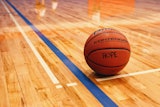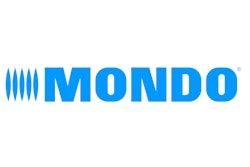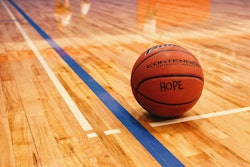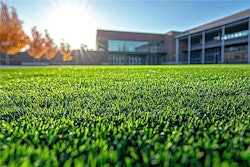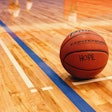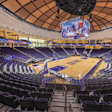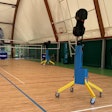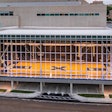![[Photos courtesy of Tarkett Sports]](https://img.athleticbusiness.com/files/base/abmedia/all/image/2020/05/ab.spot520_feat.png?auto=format%2Ccompress&q=70&w=400)
With gymnasiums and entire high schools and colleges sitting empty across the United States, facility managers may be wondering whether their scheduled flooring projects and maintenance can continue as planned. Here's a look at how some flooring companies are taking advantage of vacant gyms and using this spring to get ahead.
No one within the flooring industry knows how much time they'll have to finish the projects on their dockets, as schools and businesses across the country deal with the ramifications of the COVID-19 pandemic. To make things more complicated, each state is handling the coronavirus outbreak — and corresponding stay-at-home orders — in different ways, meaning flooring dealers and manufacturers are navigating a range of differing federal and state guidelines as they look to complete projects.
"I've talked to several contractors, and it's really a mixed bag across the country," says Maple Flooring Manufacturers Association executive vice-president Dan Heney of how the coronavirus is impacting the flooring industry. "You've got some states where it's full speed ahead for construction projects, especially school construction, and then you've got some states where they've completely shut all construction down. They're very uneasy about what's going to happen."

Getting ahead
In the states that are allowing construction to continue, schools and contractors are working ahead of schedule on projects that typically get done when school is out for the summer and gyms are empty.
"Usually summer is the busiest time of the year for flooring contractors, because schools are closed," Heney says. "That's when they get in there and they do the installs, they do a lot of resandings and they do a lot of maintenance calls."
Aacer Flooring, a hardwood manufacturer in Peshtigo, Wis., has seen the state-to-state differences firsthand.
"Some contractors have been able to start projects prior to their summer schedule, including the opportunity to do seasonal screening and recoating of existing floors that are commonly not done until the school year is completed," Aacer technical advisor Randy Randjelovic says. "Whereas other contractors have projects scheduled to begin now that are on hold until an undetermined starting date."
RELATED: Find more solutions for your facility in the Buyers Guide
Giancarlo Aimone, the marketing director at indoor sports flooring company Tarkett Sports, says that Tarkett would like to be doing more ahead-of-schedule work, but getting into schools means having someone there to open the school doors. That's not always realistic when the public has been encouraged — or ordered — to keep their distance from one another. Despite the uncertainty, Tarkett has continued to find willing buyers during the quarantine period.
"We're getting verbals, but we're not getting the purchase order because there's no way for us to anticipate a delivery date right now," Aimone says. "There's so much uncertainty in the world. For us, that seems to be the biggest issue. So it's just pushing jobs along currently and starting new jobs. We are getting leads, which is kind of crazy; people are still proactive in looking for applications that we offer. But at the same time, it's hard for them to commit to something 100 percent, which I understand. Let's be honest, we're all in the same boat, and I'm sure we all feel the same way."
It's a similar story at Mondo, where director of marketing and communications Latasha Pittman says the company doesn't know how long the situation will last or how the flooring industry will be affected.
"Right now, we're not too sure how it's going to impact us," Pittman says, noting that the scenario of dealers working ahead of schedule only lasts as long as manufacturing continues at a normal pace. "The issue would become materials. If the orders are already in house, then that's fine, but delays in shipping would obviously delay a project. Right now we're not experiencing that yet."
Distance comes naturally
Flooring manufacturers have typically been considered part of the agricultural and construction industries, making them essential manufacturers. As such, things are moving along as usual, and they're doing all they can to ensure that this remains the case.
"We are being proactive in sanitizing common areas and practicing social distancing with our employees. All sales and office staff are working from home. To date, our chain of supply has not been affected," Aacer general manager Ray Webb says, noting that the residential market, which Aacer also serves, has seen a delay in shipments as homeowners are less willing to move forward with in-home installations.
The gymnasium flooring industry is wary of similar production difficulties as the shutdown continues. However, Heney says that the gym flooring industry has several factors that allow for natural social distancing.
"If you've ever been to a flooring mill, there's lots of space between workers," he says. "From different stages in the milling process, you've got quite a bit of distance between people. The same can be said when you're installing a gym floor. It's pretty easy to follow social-distancing guidelines there. When you're nailing a floor or painting a floor, you're not really right on top of each other. Those are benefits of this industry, in terms of what's going on right now. It's fairly easy to maintain social distancing."
RELATED: PRODUCT SPOTLIGHT 2020: Gymnasium Products and Indoor Surfaces
Still, operations need to be altered and MFMA is doing what it can to communicate with companies. The association is passing along information, encouraging social distancing and offering advice on how to keep gym floors healthy when no one is in the schools.
"I wouldn't say it helps the health of the floor," Heney says of the time away from gyms. "It really just depends on what schools are doing. Schools maintain their environments differently from when they're occupied to unoccupied. Most of the time, I've seen that if the school is unoccupied, they set back the HVAC system, and that can be detrimental to the floor."
Randjelovic says schools should follow standard recommendations, whether occupied or not, to control the environment as usual, as turning off mechanicals may result in extreme dry or humid conditions and negatively affect flooring and floor system components.
MFMA recommends maintaining an environment that is 35 to 50 percent relative humidity and between 55 and 75 degrees Fahrenheit. However, those numbers can change depending on the geographic climate in which the gym is located. Heney says the most important part of maintaining a healthy gym floor is staying within a 15 percent fluctuation in indoor relative humidity.
While protecting the wood from adverse effects is important, once society returns to normal, there is going to be increased awareness of surface cleanliness. The MFMA is doing what it can to keep members informed about ways to disinfect gym floors.
"We posted some information about cleaners that you can use to help kill coronavirus," Heney says, noting that he reached out a manufacturer of hygiene products. "I sent him that EPA list and said, 'Hey, which of these products are good for gym floors and which are bad?' And he gave me some insight, so I thought I'd share that with everybody. That's going to be important going forward. When schools reopen, they want to make sure that their floors don't have coronavirus on them. Schools are going to be empty for so long, and viruses can only live on surfaces for so long that it probably won't be a factor, but better safe than sorry."
A customized touchMany schools moving forward with projects during the current crisis aim to add a bit of flair to their gymnasium floors. "We're seeing a lot of changes from a design impact, like different colored keys where we may do the filled in area in one color and the basketball free-throw lines and circles in a different color," says Latasha Pittman, director of marketing and communications at Mondo. "We do a lot of inlaid logos in our synthetic work where we waterjet cut their school in the center circle. We can use waterjet cutting technology to do a nice logo and install it in the floor. They don't have to worry about repainting it later or anything like that." While the inlaid logos are a trend in synthetic flooring, wood floors have also seen an uptick in artistry. "Increased numbers of hardwood athletic floors include creative stain, logos and paint, which in many instances can be described as works of art," says Aacer technical advisor Randy Randjelovic. "The use of stains to create outlines of city skylines, landscapes and objects are good examples of customized floors." Companies are also attempting to put more of the design process in the hands of customers. Tarkett's new website is going to offer a "build-a-court" feature that will allow potential customers to test drive different colors and design options. "Then we know right away what they want and we can play around with that," says Giancarlo Aimone, the marketing director for Tarkett. "The more colors we offer, the more flexibility our customers have to create something interesting. More and more, that's a big part of it, especially in certain territories in the United States." |
This article originally appeared in the May 2020 issue of Athletic Business with the title "Gymnasium flooring companies produce as schools shut down." Athletic Business is a free magazine for professionals in the athletic, fitness and recreation industry. Click here to subscribe.














